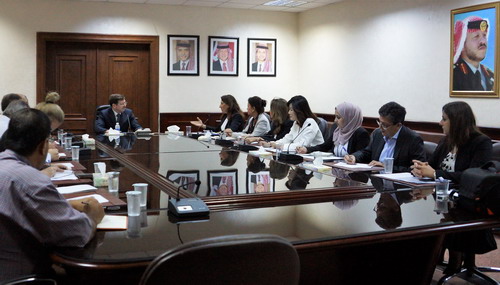 WHO Representative to Jordan Dr Maria Cristina Profili (top of table, right) stated that national action plan on AMR facilitated and provided a platform for the implementation of all AMR-related activities in Jordan20 September 2018 – Antimicrobial resistance (AMR) is widely recognized by global leaders, technical experts and policy-makers as one of the most challenging global problems of the 21st century. Initial findings published in WHO’s “Antimicrobial resistance: global report on surveillance” in 2014 raised international concern on widespread resistance that has subsequently been confirmed by data provided by 22 countries in the first Global Antimicrobial Resistance Surveillance System (GLASS) report in 2018.
WHO Representative to Jordan Dr Maria Cristina Profili (top of table, right) stated that national action plan on AMR facilitated and provided a platform for the implementation of all AMR-related activities in Jordan20 September 2018 – Antimicrobial resistance (AMR) is widely recognized by global leaders, technical experts and policy-makers as one of the most challenging global problems of the 21st century. Initial findings published in WHO’s “Antimicrobial resistance: global report on surveillance” in 2014 raised international concern on widespread resistance that has subsequently been confirmed by data provided by 22 countries in the first Global Antimicrobial Resistance Surveillance System (GLASS) report in 2018.
Since 2015, AMR has gained significant high-level attention in Jordan, underpinned by external advocacy by international partners. Several achievements have been accomplished in Jordan since then, where a national action plan on AMR in Jordan was submitted to WHO in May 2018. The plan includes a number of priority actions that will address the need to improve AMR detection, and the surveillance of antimicrobial-resistant pathogens and infections caused by them.
With the support of the Korea International Cooperation Agency (KOICA), WHO is supporting Jordan to pursue their efforts to strengthen AMR detection and surveillance in the country. Several WHO missions have provided technical expertise to strengthen national AMR surveillance and develop public health interventions to combat AMR.
WHO conducted a technical expert mission in Jordan from 16 to 20 September 2018 to provide technical support and expertise to the Ministry of Health and national stakeholders in developing a national AMR surveillance system.
Jordan is currently part of the WHO project “Strengthening global and national surveillance systems through strengthening national laboratory capacities and the workforce for surveillance of AMR,” which is also being conducted in Laos, Mali and Peru.
Led by WHO Representative to Jordan Dr Maria Cristina Profili, the expert mission met with H.E. Minister of Health Dr Mahmoud Al-Sheyyab and representation from KOICA. During the meeting, Dr Profili asserted that the national action plan on AMR facilitated and provided a platform for the implementation of all AMR-related activities in the country.
H.E. Minister of Health shared his vision for the expansion of the system to ensure system coverage for all areas of the country, telling the mission that Jordan already has an information systems in place that would serve an excellent base for the establishment of the AMR surveillance system.



